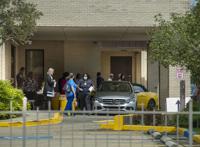When paramedic Haley Fisher learned that Baton Rouge Emergency Medical Services was assembling a strike team to respond to coronavirus patient calls, she immediately volunteered.
Fisher, 29, said she is young and healthy, without kids or a partner who she might accidentally infect in her line of work.
"I would rather step forward to essentially blunt and block some of my coworkers that have children, or are pregnant, or have families at home," she said.
This all-volunteer team of 22 paramedics spends days and nights responding to positive or suspicious COVID-19 calls so their colleagues don't have to. Their fleet includes two ambulances and two sprint units — trucks that don't have patient capacity.
EMS spokesman Mike Chustz said that the team was formed in March to conserve personal protective equipment, although they have fortunately not run out of gear so far.
Until recently, the team used gas masks, along with gowns and booties, for the coronavirus calls. But, in the past two weeks, medics have been outfitted with new, personalized P95 masks, which Fisher describes as "souped up" versions of the popular N95 mask.
Not one paramedic on the strike team has tested positive for COVID-19 since their formation, Chustz said.
In normal times, the day-to-day experiences of a paramedic can vary wildly. But Fisher said she has never before encountered such rapid and constant change in her job as she has on the coronavirus beat.
"I'd wake up and the next day I was like, 'All right, I'm ready for this next day of unknown.'"
Indicators of the virus changed quickly as more information was released by the national Centers for Disease Control and Prevention. Different virus symptoms seemed to develop as the weeks passed. In the first days of the outbreak, Fisher responded to calls where patients had flu-like symptoms, from fever to cough. As time wore on, some patients seemed to get worse.
"Now we've got people — their lungs sound like mud," she said. "Their oxygen levels are low. Their heart rates are fast. They are huffing and puffing."
As these patients struggled to breathe, their lungs would get infected; many would become septic and go into cardiac arrest. Fisher began to arrive at calls where she knew the patient would likely not recover.
These calls have taken a toll.
"It's very emotional," she said. "I really hate seeing people at that place of suffering. And I get so sad because, depending on how they are presenting to us, I get upset that they're not going to make it out of the hospital."
While she freely cries over these patients, there are also those who beat the odds and make it. Fisher had a patient who was on a ventilator for 11 days and still recovered. She cried over this patient too — for joy.
"I've had really hard days," she said. "And really easy days."
To cope, Fisher wakes early and works out, meditates and mentally prepares herself for her shift. When she comes home at the end of a long day, her golden retriever, Delta, greets and comforts her.
Fisher has also had to be flexible in how she approaches each new patient. With some coronavirus calls, patients have critically low oxygen levels, which complicates emergency treatment.
"I can't think like a regular paramedic," Fisher said.
Instead of providing immediate medication, the best thing paramedics can do is try to get the patient to higher oxygen levels so that if they need to be intubated when they get to the hospital, they will be stable enough to go on the ventilator.
Since the outbreak began, EMS data show the week of March 30 had the highest call volume, with 249 calls that were coded as possible COVID-19. However, in the past week, dispatches have dropped 68% since the peak of the outbreak.
Chustz said the strike team plans to suspend its two sprint units at the end of May and wait until June 15 to determine whether to decommission the ambulances dedicated to COVID-19 response.
For Fisher, she is glad her days have been quieting down, but she is still ready to respond if and when she is needed.
"I take a lot of pride in being of service," she said. "Send me in."
More than $3.6 billion in Economic Impact Payments (EIP) have gone to the state of Louisiana during the coronavirus pandemic, according to num…
For decades, south Louisiana residents have called the sugar white sands of the Gulf Coast their summer playground, and that might be even mor…
"strike" - Google News
May 24, 2020 at 08:00AM
https://ift.tt/2ZwjJxz
Meet the 'strike team': This group of Baton Rouge EMS responds exclusively to coronavirus calls - The Advocate
"strike" - Google News
https://ift.tt/2WheuPk
https://ift.tt/2VWImBB
Bagikan Berita Ini


















0 Response to "Meet the 'strike team': This group of Baton Rouge EMS responds exclusively to coronavirus calls - The Advocate"
Post a Comment